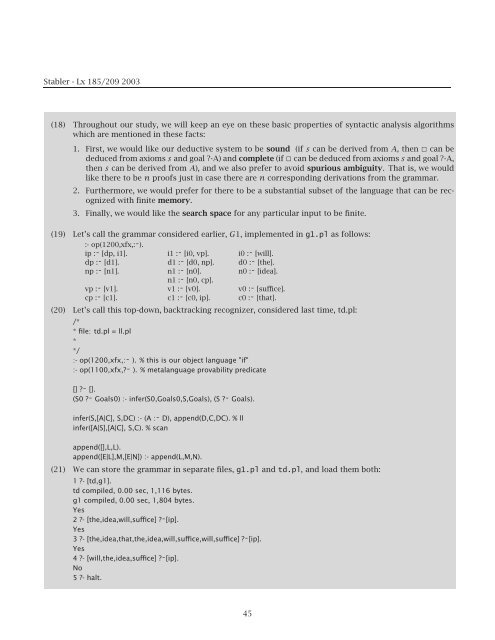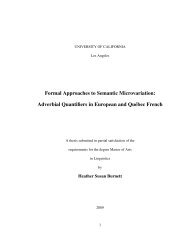Notes on computational linguistics.pdf - UCLA Department of ...
Notes on computational linguistics.pdf - UCLA Department of ...
Notes on computational linguistics.pdf - UCLA Department of ...
Create successful ePaper yourself
Turn your PDF publications into a flip-book with our unique Google optimized e-Paper software.
Stabler - Lx 185/209 2003<br />
(18) Throughout our study, we will keep an eye <strong>on</strong> these basic properties <strong>of</strong> syntactic analysis algorithms<br />
which are menti<strong>on</strong>ed in these facts:<br />
1. First, we would like our deductive system to be sound (if s can be derived from A, thencan be<br />
deduced from axioms s and goal ?-A) and complete (if can be deduced from axioms s and goal ?-A,<br />
then s can be derived from A), and we also prefer to avoid spurious ambiguity. That is, we would<br />
like there to be n pro<strong>of</strong>s just in case there are n corresp<strong>on</strong>ding derivati<strong>on</strong>s from the grammar.<br />
2. Furthermore, we would prefer for there to be a substantial subset <strong>of</strong> the language that can be recognized<br />
with finite memory.<br />
3. Finally, we would like the search space for any particular input to be finite.<br />
(19) Let’s call the grammar c<strong>on</strong>sidered earlier, G1, implemented in g1.pl as follows:<br />
:- op(1200,xfx,:˜).<br />
ip :˜ [dp, i1]. i1 :˜ [i0, vp]. i0 :˜ [will].<br />
dp :˜ [d1]. d1 :˜ [d0, np]. d0 :˜ [the].<br />
np :˜ [n1]. n1 :˜ [n0]. n0 :˜ [idea].<br />
n1 :˜ [n0, cp].<br />
vp :˜ [v1]. v1 :˜ [v0]. v0 :˜ [suffice].<br />
cp :˜ [c1]. c1 :˜ [c0, ip]. c0 :˜ [that].<br />
(20) Let’s call this top-down, backtracking recognizer, c<strong>on</strong>sidered last time, td.pl:<br />
/*<br />
* file: td.pl = ll.pl<br />
*<br />
*/<br />
:- op(1200,xfx,:˜ ). % this is our object language "if"<br />
:- op(1100,xfx,?˜ ). % metalanguage provability predicate<br />
[] ?˜ [].<br />
(S0 ?˜ Goals0) :- infer(S0,Goals0,S,Goals), (S ?˜ Goals).<br />
infer(S,[A|C], S,DC) :- (A :˜ D), append(D,C,DC). % ll<br />
infer([A|S],[A|C], S,C). % scan<br />
append([],L,L).<br />
append([E|L],M,[E|N]) :- append(L,M,N).<br />
(21) We can store the grammar in separate files, g1.pl and td.pl, and load them both:<br />
1?-[td,g1].<br />
td compiled, 0.00 sec, 1,116 bytes.<br />
g1 compiled, 0.00 sec, 1,804 bytes.<br />
Yes<br />
2 ?- [the,idea,will,suffice] ?˜[ip].<br />
Yes<br />
3 ?- [the,idea,that,the,idea,will,suffice,will,suffice] ?˜[ip].<br />
Yes<br />
4 ?- [will,the,idea,suffice] ?˜[ip].<br />
No<br />
5?-halt.<br />
45
















